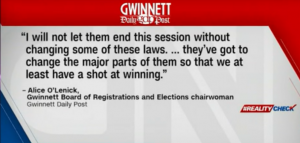(CNN)There’s a war over voting.
Set all these things aside:
the blatant hypocrisy of Texas Sen. Ted Cruz’s vacation after he criticized others
the mealy mouthed effort to claim he was just trying to be a good dad
his abrupt about-face and apology
and the uncomfortable fact that someone on his wife’s text chain outed their supposed friend as the Cancun ringleader.
What makes the Cruz vacation scandal most interesting is that while he’s four years from reelection, this silliness could help make him among the most vulnerable incumbents if he runs for reelection in 2024.
That’s no bold prediction even though we’re years away in part because of Texas, where Cruz is a symptom of a much larger issue for Republicans: that the state is changing, becoming more friendly to Democrats and will, at some point, be the key US political battleground.
However.
Republicans are also learning from the gains Democrats made in 2020 and there’s an effort afoot — specifically in Texas, Georgia and a number of places still controlled by Republicans at the state level — to make it more difficult to vote.
Read this from CNN’s Kelly Mena:
Georgia voting rights groups are denouncing a sweeping voting bill introduced this week by Republican state legislators as a “direct attack on democracy” and on Black voters.
The bill comes as Georgia has become ground zero for election law changes in the wake of the 2020 election. Republicans in the state, citing baseless allegations of voter fraud pushed by former President Donald Trump and other GOP officials, have moved to roll back access to mail-in voting and early voting.
The full story is here.
Not just Georgia. This is all part of a larger, coordinated Republican strategy to curb, restrict and more closely monitor voting practices like mail-in ballots that, along with distaste for now-former President Donald Trump and frustration with his policies, fueled record turnout in 2020.
A group of Republican state legislators and secretaries of state announced the formation of a commission to look at election laws.
The Brennan Center for Justice tracks voter-related legislation and has identified 165 bills in 33 states that would restrict voting in a variety of ways:
cull early voting lists
placing a new registration obstacles in the way of voters
purge voter rolls
require voters to actively request an absentee ballot
tighten rules about witness signatures.
Florida Gov. Ron DeSantis also unveiled a full slate of proposed voting changes Friday.
Broken record. There’s no evidence of widespread voter fraud in the 2020 election, despite what Florida resident Donald Trump says. The idea of fraud is central to Republican calls for these new rules.
“We need to make sure that our citizens have confidence in the elections, that they have the ability to vote,” said DeSantis. “We want, obviously, everyone to vote. But we don’t want anyone to cheat. And we want to make sure that we strike that appropriate balance.”
In Texas, there’s a proposal to strip registration authority from county clerks and streamline it through the state, according to Brennan’s review. Many large counties in Texas are controlled by Democrats. Republicans control the state government.
Conversely, Democrats in those states have proposals to make it easier to vote.
Mena has also written about how voting rights activists want Democrats in Congress to pass a sweeping election reform and voting rights package to block state election reforms. And read this story, with CNN’s Fredreka Schouten, about elections officials heading for the exits.
Broken systems
The New York Times had two interesting education stories Friday.
One headline will make you feel really good:
A College Program for Disadvantaged Teens Could Shake Up Elite Admissions
The other one will make your blood boil:
‘I Am Worth It’: Why Thousands of Doctors in America Can’t Get a Job
The undercurrent in both of these reports is testing — the SAT/ACT, which might be on its way out, and the MCAT, which creates a stumbling block that prompts would-be medical students to go overseas for training that later makes it harder for them to be matched with a residency program.
The idea that disadvantaged teens who might not do well on standardized tests can compete in a top-level college environment is great to hear.
The idea that people who have gone to and graduated from medical school can’t get matched with a residency program is maddening. That the US health system is facing a doctor shortage when qualified people can’t pry their way in is criminal.
I mention these two reports because it’s clear that the US education system has built so many barriers to entry, just as the US election system turns on so many barriers to voting.
The difference might be that while the Covid election taught Republicans they need to clamp down on people voting, Covid education may speed a re-thinking of how we assess our kids and prepare them for jobs.
And it rewards people whose judgment that often turns out to be flawed. Ted Cruz and his wife both went to Harvard, after all. That didn’t make them smart enough to not go on vacation while his constituents were powerless.
CNN

